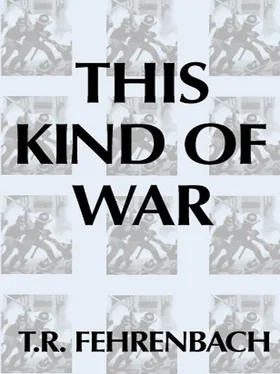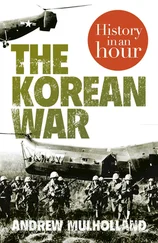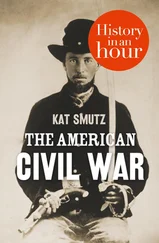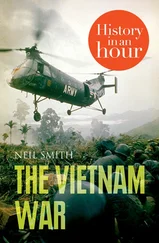It was probably necessary for the opposition to win, in 1952.
Whatever the domestic issues, only a Republican Administration could have dragged the American liberal middle classes into world affairs—an entanglement they violently distrusted. Only a Cabinet of men who never once, not even in college, had seen anything attractive in the far left could have brought to Americans understanding that Communism must be lived with, even while it is opposed.
This Republican Administration would do damage—it would toy with solutions such as "massive retaliation," and it would seek cheap answers: "More bang for a buck." It would continue to dislike professional legions, and try to do away with them. It would find, painfully, that all the old ideas dear to business-liberal society would not work.
It would, after a year or two, adopt containment, and continue virtually unchanged, every foreign policy of the Truman Administration.
They found, as would a new Democratic champion in the future, that despite the call for new looks, new solutions, such looks still revealed only the stone face of Communism and Soviet power; and new solutions, however appealing, remained too dangerous.
And therein continued the tragedy of Americans of these years. Containment of Communism could never be a solution, of itself; it could be only a ploy for time, a stopgap, a pragmatic attempt to hold a dangerous line as long as possible.
But the destiny of America, hopefully, did not lie in pragmatism or stopgaps. The pragmatic man worries about today or tomorrow, never the day past tomorrow. He rarely seeks, and he seldom creates.
Pragmatists create no new ways of life; they found no new religions, nor do they become martyrs to them. They believe in balance, compromise, adjustment. They distrust enthusiasms; they trust what works.
They make good politicians, excellent bankers, superb diplomats.
They never build empires, either of the earth or of the spirit.
They often preside, wisely and temperately, over their liquidation.
Pragmatists did not land at Plymouth Rock, nor did they "pledge their lives, property, and sacred honor," at Philadelphia.
Containment, forged in the forties and carried through the fifties and into the sixties, was a pragmatic policy. It was necessary, for there is a time for defense, even as there is a season for all things. But it was sterile; it could afford only time, and time, of itself, solves some problems, but not many.
In the middle of the century, hopefully, as Democrat and Republican hammered at each other on the hustings, mouthing moth-eaten arguments, and as men held high and lonely hills along the battle line of civilization in Korea, a new policy might have come forth.
It seemed the hour, now, for a concept as brilliant as Wilson's world democracy—so glorious in vision, so utterly impossible of attainment—without Wilson's flaws, or a crusade with a base as practical as that of containment, without its emptiness of spirit. For the one thing no American might have, in the middle of the century, was the status quo ante quem . He could hold the far frontiers, with money, guns, men, or trade. He could try to soothe a worsening world as the hour demanded, day to day, year to year, from Acheson to Dulles, to Herter and Rusk.
But so long as he had no new policy, so long as he sought only to contain, the enemy without would always hold the initiative.
In Washington, in November 1952, there was a changing of the guard. There was nothing new, but that changing of the guard affected history. It did one thing good and one thing bad—it froze in men's minds the political dangers of sending men to hold the far frontier, and every future government would be reluctant to order it, but it hastened the end of the Korean War.
In Korea, it was stalemate.
Neither side could advance; neither side would retreat. Each side held its own hills and valleys in depth, but from November 1951 onward, the enemy continued to be more aggressive than the U.N.
He patrolled aggressively, and he launched limited attacks, again and again. He took hills, and he took the platoons and companies that had been on them. And he killed more men when the U.N. attacked to take its property back. Usually, the action was minor, except to the men hip-deep in swarming Chinese, or pounded by artillery fire falling at the rate of hundreds of shells per minute.
One division commander in Korea recognized that the warfare resembled that of the Western Front, 1915-1918. And like that trench fighting, it was more costly than those unfamiliar with it would think.
Exactly half as many men were killed and wounded during the stalemate as were lost during the violent war of maneuver that surged up and down the peninsula.
By summer 1952, the enemy had grown more aggressive. He waged a bitter struggle over a number of U.N. outposts from Mabang to Kumsong to Oem'yon. On 17 July at 2200 hours, after devastating artillery preparation, a CCF battalion overran the U.N. outpost on Old Baldy, west of Ch'orwon, a hill neither completely inside one defensive system nor in the other.
For four days a seesaw battle raged for the blasted, denuded hill. The 23rd Infantry eventually had elements of E, F, I, L, B, K, and G companies on the hill at one time or another; it took hundreds of casualties. Its commander, trying to control the action day after day, without rest, lost control and had to be relieved.
The battle for Old Baldy, which the CCF eventually lost, proved that the enemy had as many, if not more, field guns as the U.N. He could not, however, switch their fires of employ them as effectively as the Americans.
It was not until 31 July that a full battalion attack of 1/23 retook the hill—a position that could accommodate comfortably only a single rifle company.
Here, and elsewhere, the U.N. defenders learned that they would have to dig deeper. Soon, more and more positions were completely underground, and all of the bunkers—which tended to collapse under rain or artillery—were reinforced with logs.
On 16 September the CCF tried for Old Baldy again. First, an estimated 1,000 rounds of artillery fell on the small hill in a ten-minute period; then a battalion of CCF surrounded it and assaulted it from all sides. They took Baldy, and K Company, 38th Infantry on it, with lightning speed, while a diversionary attack overran Pork Chop Hill, to the northeast of Old Baldy.
On the night of 20 September, after heavy artillery preparation, 2/38 attacked to retake their property. Plunging through a hail of enemy fire, the battalion cleared the crest and was in control 21 September. The attack was well coordinated and well-pushed home, and it killed or wounded more than a thousand Chinese.
But the American losses, overall, were nearly as high.
The pattern of this hill fighting, which resembled that of Heartbreak and Bloody ridges, was repeated again and again. Aggressive, the CCF would plaster a forward hill or outpost with tremendous concentrations of artillery, then assault it with large forces, and overrun it.
Soon, most of the artillery fires of two to four divisions would be falling into one tiny area, as a seesaw battle raged. The U.N. would not initiate such attacks, as a rule, but it would not permit the enemy to push it about. Given an inch, it was the custom of the Chinese to strike for a mile. The U.N. forces had to return the CCF maneuver, in spades.
During these immense artillery and infantry duels, in which thousands of men were hurt or killed, the crowning horror was that usually units on either side of them, or beyond regimental HQ on the front, were completely unaware there was a war on.
Again and again the CCF felt free to attack, into a limited area.
On 6 October they struck east of Baldy and Pork Chop, against Arrowhead and White Horse Mountain—now, with long occupancy, every hill along the battle lines had its own name—and the preparatory fires there exceeded anything yet seen. Jim Fry, CG of the 2nd Division, said they were beyond anything he had known in his previous considerable military experience.
Читать дальше












